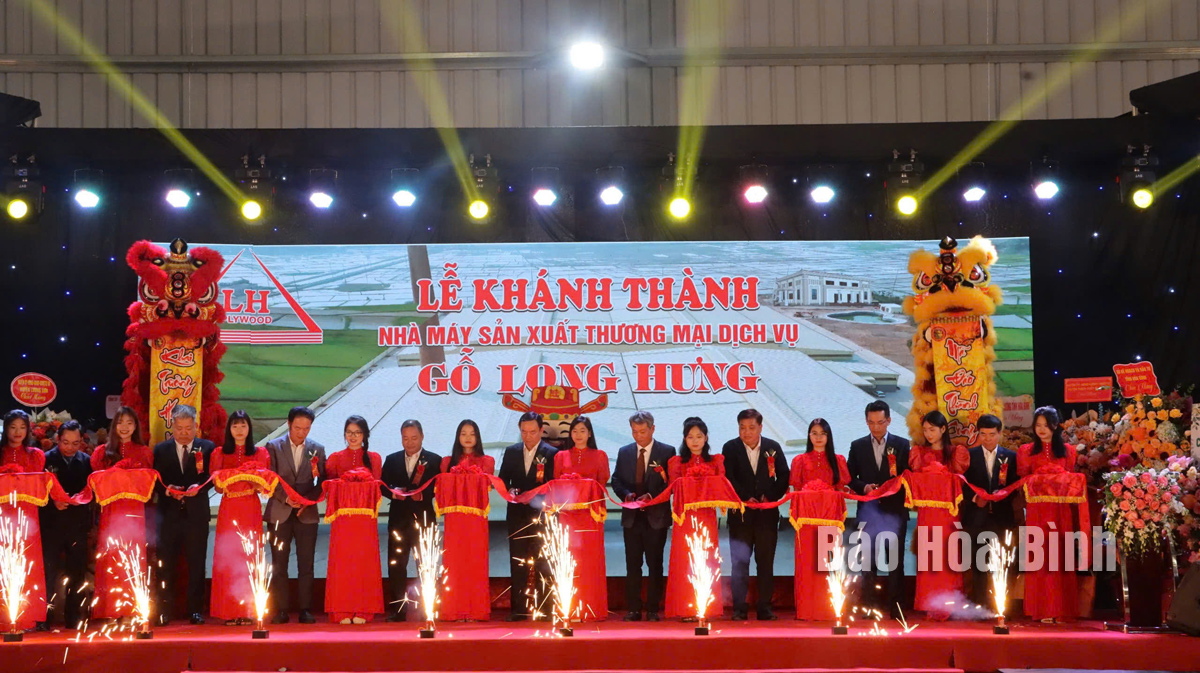
In Thanh Cao Commune, Hanh Dat Company Limited has just held the Inaugurating Ceremony of Long Hung Manufactuaring, Trading and Service Wood Factory. There was the attendance of Mr. Quach Tat Liem, the Vice Chairman of the Provincial People's Committee.
Mr. Quach Tat Liem, the Vice Chairman of the Provincial People's Committee and delegates were cutting the ribbon to inaugurate Long Hung Manufacturing, Trading and Service Wood Factory in Thanh Cao Commune, Luong Son District.
Long Hung Long Hung Manufacturing, Trading and Service Wood Factory produces multi-layer plywood with a design capacity of 90,000m3 a year and a total investment of over 200 billion VND, which is invested by Hanh Dat Company Limited - a member of Long Hung Wood Corporation. The factory has been built on nearly 4 hectares, of which the factory construction area is 2 hectares. After being put into operation, the project is expected to create jobs for over 400 employees.
After more than one year of construction, the investor has completed the factory's construction and put it into operation, ensuring progress and quality. The factory promises to make a positive contribution to increasing the province's production and export value, creating more jobs, increasing revenue for the state budget, and contributing to promoting the local socio-economic development.
Making the speech at the ceremony, the Vice Chairman of the Provincial People's Committee, Mr. Quach Tat Liem congratulated Hanh Dat Company Limited for constructing the factory and putting it into operation ensuring the progress and quality; affirming that the authorities at all levels always accompany and create the best conditions for the factory to operate and develop sustainably. He requested the company to fully comply with the provisions of the law on the labor safety, environmental protection, fire prevention and fighting, etc. It is necessary to continue researching and diversifying the products according to the customers’ tastes; strengthening the trade promotion, the market development; determining the form of the association, ensuring the harmony of interests and rights of farmers and businesses; contributing to ensuring the social security in the area.
Dao Village’s honey – a product certified with a 3-star OCOP (One Commune One Product) rating by Thong Nhat Agricultural Cooperative in Dao Village (Hoa Binh City) – is highly regarded by consumers for its quality, richness, and variety in packaging. The distinctively sweet taste of Dao Village’s honey leaves a lasting impression on anyone who has tried it.
In alignment with Project No. 07-DA/TU, issued by the Hoa Binh provincial Party Committee on November 1, 2021, Lac Thuy district has actively promoted investment and supported the sustainable development of its industrial and handicraft sectors during the 2021–2025 period. Alongside this, the district has remained committed to preserving and revitalising traditional craft villages.
Located in the northern part of Lac Thuy district, with a temperate climate and fertile soil, Phu Thanh commune has great potential and advantages in growing tea. The long-standing experience, combined with strict adherence to organic farming practices in the tea gardens, ensures that the dried tea products from Phu Thanh and Lac Thuy as a whole are sold out immediately upon production, providing a stable and prosperous life for the local people.
Amid efforts to streamline the administrative apparatus, Hoa Binh province has intensified measures to address challenges in land clearance, resettlement support, and infrastructure investment, aiming to speed up the progress of key projects.
Hoa Binh province has posted an unprecedented economic growth rate of 12.76% in the first quarter of 2025, marking its highest quarterly performance to date and positioning it as the second fastest-growing locality in the country, trailing only Bac Giang province.
Under current regulations, products in the One Commune – One Product (OCOP) programme that are rated three stars or higher must undergo re-evaluation every three months. However, in reality, some of these products fail to consistently meet the required standards, raising concerns about the sustainability of their OCOP certification. This underscores the urgent need for producers to enhance product quality and gradually develop their OCOP products into strong, marketable brands.



